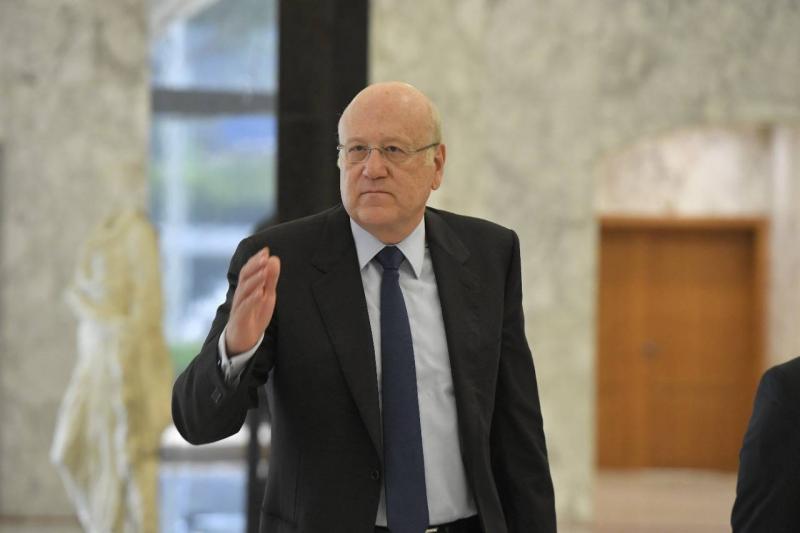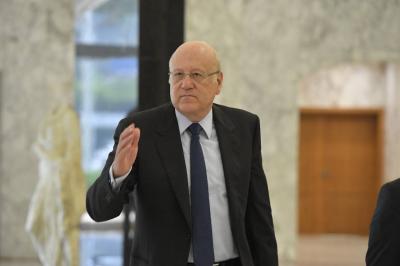As the situation continues to be explosive on the southern front, sometimes surpassing the areas of engagement, Lebanon continues to receive Israeli threat messages. In response, Hezbollah Secretary-General Hassan Nasrallah stated yesterday, "We are ready for war, and we do not fear it or shy away from it; we will confront it." Meanwhile, no significant developments have been recorded regarding the presidential election. The American presidential envoy Amos Hochstein left without a known return date, while relevant circles await the return of French envoy Jean-Yves Le Drian, expected before the end of this month, amid talks of an upcoming meeting of the international and Arab quintet at a secondary level, as reported by "Al-Jumhuriya."
Today, Prime Minister Najib Mikati will head to Davos to attend the international forum on "Rebuilding Trust in the Global Economy Amid Geopolitical Risks." It is expected that he will meet with U.S. Secretary of State Anthony Blinken, who recently conducted a tour in the region on the sidelines of this forum, which will kick off today in Switzerland. More than 60 heads of state and government will participate, along with 2,800 figures, including hundreds of economic leaders.
In addition, attention will focus in the coming days on two important conferences. The first is the meeting of European Union foreign ministers scheduled for the 22nd of this month, followed by a United Nations-hosted meeting on the 23rd dedicated to "Dialogue on Middle Eastern Issues," primarily concerning the situations in Gaza and southern Lebanon. Regarding the first meeting, European diplomatic sources revealed that preparations are underway for the foreign ministers meeting. The purpose of European Union Foreign Policy Chief Josep Borrell's recent tour was to provide a preliminary report to the attendees summarizing the results of his earlier mission on behalf of 27 European countries. These sources indicated that Borrell would focus on addressing the proposed solutions for the situation in southern Lebanon and the efforts to implement UN Security Council Resolution 1701 as a starting point to halt the war in the south. However, this is considered unlikely until a ceasefire is arranged in Gaza, which is the initial step to closing the "support front" that Hezbollah opened following the "Flood of Al-Aqsa" operation. Borrell will also present an initial view on what is considered feasible to implement regarding the so-called "first day" in both Gaza and Lebanon after the war ends, emphasizing that his discussions will cover, in addition to the situation in southern Lebanon, the form of the new authority that will govern Gaza, as evident from his visits to Beirut and other targeted capitals in his New Year’s trip that began in Tel Aviv and Ramallah before including Beirut, Amman, and Riyadh.
As for the UN meeting, according to "Al-Jumhuriya," it has been decided that Foreign Minister Abdallah Bou Habib will head Lebanon's delegation, accompanied by several advisors. He will present Lebanon’s perspective, which was outlined before the outbreak of the war on Gaza and Lebanon, relating to the comprehensive plan he presented to UN mission leaders on the eve of the extension of UNIFIL forces on August 30. This plan addressed a "comprehensive peace deal" which, if adopted, would ensure the implementation of stages related to completing the application of Resolution 1701 and transitioning from the phase of "freezing military operations to a ceasefire," which has not happened since 2006 for a thousand reasons.
Bou Habib's paper will also renew the content of the various messages Lebanon has sent to the UN, accompanied by a collection of complaints against Israel since the onset of the war in the south and the accompanying assaults on Lebanese army positions and massacres that targeted civilians in Ainatha and several southern villages. Additionally, it will include what the UN, European, and American envoys are pursuing in preparing for final agreements concerning the delineation of Lebanon's borders, which prioritize two issues: halting the Gaza war and the necessity of having a President for Lebanon, as it enjoys specific authorities when signing any international agreement or treaty and before the UN, similar to what occurred with the maritime border agreement.




